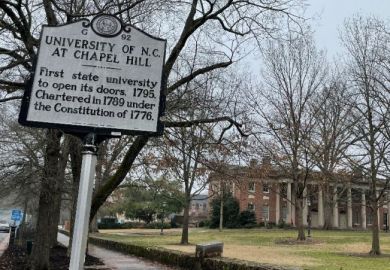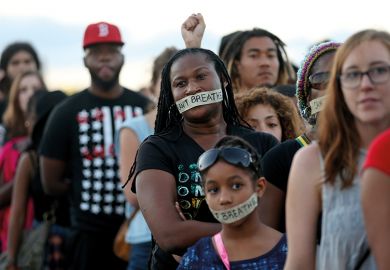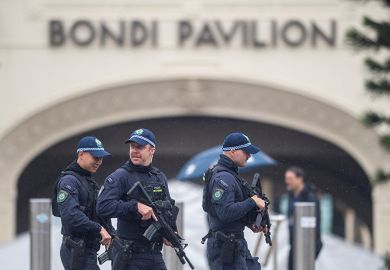An investigation ordered by Boise State University has found no basis for a conservative-fuelled accusation that a white student was denounced for his skin colour during a class discussion of structural inequality.
The startling allegation – at a moment of growing political interference in US curricula – led Boise State in March to suspend for a week all 55 sections of a required course with nearly 1,300 students.
Boise State ordered the suspensions on the word of a single person it identified only as a respected community leader who claimed that the student had been taunted by the class and forced to apologise either for being white or for his “white privilege”.
An external law firm hired by the university to investigate said that the complainant refused to provide more details, and that the 3,000 students who took the class over the past two semesters failed to back him up.
The complainant did not even specify the course in which the alleged abuse occurred, although the university said his description suggested University Foundations 200, a mandatory course covering diversity and ethics.
Boise State’s president, Marlene Tromp – herself a target of political critics in the heavily conservative state – said that she ordered the aggressive reaction out of a concern for ensuring that no student had been abused.
In a letter to the university community after the investigation concluded, Dr Tromp also apologised for offering limited updates during the review, calling it an attempt to avoid interfering with it.
“In this moment in our nation, much that was previously not imagined to be political has become politicised and often polarising,” she said.
Others, however, were more scathing in their assessment of the complaint and the broader political forces in the US that have been encouraging college students to videotape their classes in an attempt to foment public anxiety over alleged liberal bias in academia.
“Apparently it was all a hoax,” Hank Reichman, chair of the committee on academic freedom and tenure of the American Association of University Professors, wrote for the AAUP’s policy blog.
There was never “a shred of evidence to substantiate the accusation”, said Dr Reichman, professor emeritus of history at California State University East Bay. Yet, he noted, the complaint raised tensions as the Idaho state legislature already was cutting the university’s budget as punishment for allowing instruction in social justice.
And even with the investigation finding no wrongdoing, Professor Reichman noted, Idaho state lawmakers are still pursuing another bill that would prohibit teaching the idea that any person “is inherently racist, sexist, or oppressive, whether consciously or unconsciously”.
“Apparently undeterred by reality, the legislature is continuing to offer intrusive and illiberal solutions to this non-existent problem,” Professor Reichman said.
Yet a leading right-wing thinktank in the state, the Idaho Freedom Foundation, said it was not impressed by the university’s investigation. The law firm only interviewed 30 students, and Boise State still plans to require the University Foundations 200 course, the foundation said in a statement.
“There's obviously more here than BSU wants to admit,” the foundation said. “Nothing will be done to stop the ideological infection of the university,” it said.
Such conflicts appear to be on the rise in the US, even after the defeat of Donald Trump in the 2020 presidential election. Recent instances include University of North Carolina trustees rejecting a tenured position for the black New York Times journalist who created the 1619 Project, which teaches students about the central role of slavery and black Americans in US history.
In addition, several states – including Idaho – have passed laws that ban public schools from teaching concepts of race and racism. Tennessee, Oklahoma and Arkansas also have enacted such laws, and at least a dozen more are considering them.
Register to continue
Why register?
- Registration is free and only takes a moment
- Once registered, you can read 3 articles a month
- Sign up for our newsletter
Subscribe
Or subscribe for unlimited access to:
- Unlimited access to news, views, insights & reviews
- Digital editions
- Digital access to THE’s university and college rankings analysis
Already registered or a current subscriber?








